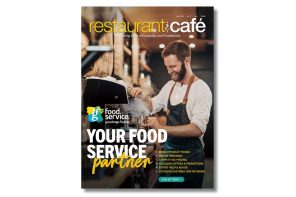As countries closed their borders and enforced physical distancing due to the COVID-19 pandemic, the food industry, already faced with struggles such as food waste and climate change, was thrown into deeper turmoil.
Food and beverage businesses, from producers to grocers, have now found themselves grappling with a very real threat to the safety and livelihoods of their employees whilst finding ways to circumvent upended supply routes.
Will the impact from the crisis radically change systems, supply chains and security for the food industry in future? A global think-tank from AgFunder Asia, Agrimax Ventures, Big Idea Ventures, Dole Packaged Foods and GROW have discussed what they see as the biggest food challenges.
“In the short term, unfortunately, there has been a huge amount of food wastage globally. Perishable produce has not been able to find a home once the F&B sector in each country stopped purchasing. The supply chain participants have had to face tremendous hardship and change their distribution channels over a very short span of time. However, I feel the biggest impact that has taken place is in the mindset of the end consumer,” explained Ankesh Shahra, Founder and Managing Director of Agrimax Ventures.
“Worldwide, almost overnight, the notion of food security and availability has become very personal to everyone. This will drive a change in consumption habits ultimately forcing the supply chain participants to realign.”
A silver lining from the COVID-19 experience is that cross-border disruptions to food production and supply has helped focus attention on and urgency to solve questions around the global food security agenda.
“This should bode well for companies operating in the agri-food tech sector, which until recently has mostly been a niche interest among investors,” noted John Friedman, Director of AgFunder Asia.
“From upstream technologies such as precision farming and mechanisation to address labour shortages, to downstream farm-to-fork systems providing traceability or food delivery services to the end consumer, the spectrum is far ranging and the need for viable solutions has never been greater.”
“Providing sufficient food for the population is the foundation for any Government,” added Shahra, believing that this will be something driven by a country’s government.
“This bodes well for farmers and producers in terms of support and income that they long deserve. Further, the private sector will also be incentivised to participate in bridging these gaps. Entrepreneurs will come in to innovate and solve issues that have surfaced. Therefore, I do believe that the Food and Agri-tech sector will see a new wave of interest and capital from long term investors.”
Accelerating transformation
Not all is lost. The crisis has pushed big brands to rethink their strategies and for smaller companies to look at transforming operations and processes. For instance, F&B outlets have turned to offering take away services or partnering food delivery platforms to continue serving customers.
For food producers such as farmers, the situation gets more complex as the pandemic has disrupted legacy systems and now traditional farm owners are facing technological, social and monetary challenges on top of climate change, production demands and food waste.
“The need to rethink our supply chains end-to-end is definitely one of the biggest trends that will shape the industry moving ahead,” said Ilanit Kabessa, Global Head of Venturing, Dole Packaged Foods.
“However, this massive challenge is composed out of many sub trends linked to technological evolution such as digitisation of supply chains, supply chain data & analytics, freight management, traceability, diversification of sources, moving to regional sourcing and so on. The complexity of this mission is getting even more intense when we look at the different needs of small holder farms vs. big farms, since most of the solutions are not fitted with the typical Asian small farms. There is a big need to explore and develop scalable valuable solutions, easy to use, which are fitted with the specific needs of this region.”
Need for robust cooperation between government and industry
More needs to be done, however. Post COVID-19, it will take the concerted efforts of government and industry to overcome the challenges brought about by the pandemic.
“The pandemic put the whole world in a tail-spin and exposed an alarming fragility in the agri-food supply chains,” commented Vandana Dhaul, Head - Accelerator Operations of GROW.
“The good part is that we now have a world that is uniting and accelerating its response to these changed circumstances. Much of the effort will necessarily come from the government in terms of additional infrastructure, regulations supporting innovation, larger financial incentives and more. However, this is also a time for ecosystem partners to step up and ensure that these initiatives to support and advance innovation and technology are carried through.”
The challenge becomes one of capacity building, and knowledge around what technologies are available to fit which need. One of the biggest challenges remains that of distribution, especially in developing Asia where post-harvest food loss ranks among the highest in the world.
“The challenge posed to supply chains amidst a time of heightened social unease is forcing governments to become more proactive in their approach to food security. I would very much like to see more attention going towards developing solutions to ensure what's being grown is getting to where it's needed, when it's needed,” noted Friedman.
“I am a great believer in future thinking as a way to shape the present. The supply chain crisis is an opportunity to rethink what the ideal supply chain should look like? What would be the right or potential model for a future post ‘just-in-time’ supply chain? How we can reduce waste across our supply chain and how we can utilise waste in new ways?” Offered Kabessa.
“We need fresh and innovative thinking. This is an opportunity for a collaborative effort to join forces and to make the change together. Big and small companies, start-ups, NGO’s, government institutions, creative leaders. This is a real opportunity to explore a paradigm shift and to innovate accordingly.”
Food & Hotel Digital Week Industry Webinar Series
Themed ‘COVID-19 and the Future of Food’, the Industry Webinar Series will bring together industry think-tanks to discuss the current reality of food and discourse on survival and success in a post-COVID world.
It will examine the impact the pandemic has wrought on supply chains and food security, and discuss the future of food systems and investments post-crisis. The 50-minute session will be moderated by Luke Tay, Principal Futurist from the Singapore Food Agency.
Other topics in the Industry Webinar Series include:
- COVID-19 Reality Check: Facts for Food Intelligence
- Food, Nutrition & Health: What COVID-19 reveals about the Foods we need
- Alternative Protein in 2020 & Beyond: Scaling an Emerging Industry
- Disruption, Security & Supply Chains: What COVID-19 teaches us about Distribution
- COVID-19, F&B & Sustainability: Business as (un)usual for our Food Systems
The Industry Webinar Series is part of the inaugural FOOD & HOTEL DIGITAL WEEK, a first-of-its-kind collaboration between Informa Markets’ Hospitality, Food & Beverage portfolio in Asia and Saladplate, an online marketplace founded by Informa Markets to serve the food and hospitality sectors exclusively.
Registration for the free Industry Webinar Series is open. To sign up please click here.
Organised by Informa Markets, the Food & Hotel Digital Week series is a first-of-its-kind collaboration between Informa Markets’ Hospitality, Food & Beverage portfolio in Asia and Saladplate, an online marketplace founded by Informa Markets to serve the food and hospitality sectors exclusively. The Food & Hotel Digital Week series will offer a platform for players operating in Asia’s food and hospitality professionals to trade, find new partners and stay connected with the community through online content, matchmaking, product showcases and live webinars. For more information, please visit marketing.saladplate.com/digitalweek
Informa Markets creates platforms for industries and specialist markets to trade, innovate and grow. As the world’s leading exhibitions organiser, Informa Markets brings a diverse range of specialist markets to life, unlocking opportunities and helping them to thrive 365 days of the year. For more information, please visit informamarkets.com






